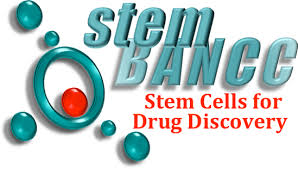AUTHOR: Prof. Jim Ross, University of Edinburgh
ABSTRACT

StemBANCC (Stem cells for biological assays of novel drugs and predictive toxicology) is a large-scale, 5 year academic-industry partnership in the area of stem cell research.
It brings together a consortium of 35 partners who share their expertise in 12 work packages. It is a collaborative project between pharmaceutical companies, research institutions and small and medium enterprises (SMEs) to exploit the rich body of experience across sectors and enhance knowledge transfer between academia and industry for patient benefit.
The goal of StemBANCC is to generate 1,500 induced pluripotent stem cell (iPSC) lines from 500 individuals, including individuals without disease and those with known diseases, characterise the cells in terms of their genetic, proteomic and metabolic profiles, and make them available to researchers.
All cell lines also undergo a rigorous quality check. A key component of the consortium is to assess the derived induced pluripotent cells for drug safety studies.
The toxicology workpackage deals with the differentiation and characterisation of hepatocytes, cardiomyocytes, renal cells and brain aggregates from the derived iPSCs and their use in toxicological assays. See StemBanss website for further information
SPEAKER'S BIOGRAPHY
Prof. Jim Ross
 James Ross is Professor of Liver Cell Biology and director of the Tissue Injury & Repair Group. The group are an integral part of the University of Edinburgh/MRC for Regenerative Medicine and have developed particular expertise in the isolation and functional characterisation of adult and foetal human hepatocytes and both embryonic stem cell-derived and foetal liver stem cell-derived populations including hepatocytes.
James Ross is Professor of Liver Cell Biology and director of the Tissue Injury & Repair Group. The group are an integral part of the University of Edinburgh/MRC for Regenerative Medicine and have developed particular expertise in the isolation and functional characterisation of adult and foetal human hepatocytes and both embryonic stem cell-derived and foetal liver stem cell-derived populations including hepatocytes.
Professor Ross has published extensively in the area of liver cell biology, liver involvement in inflammatory processes, cancer and stem cell biology. In recent years he has broadened his interests to include imaging and has developed a novel ultrasound contrast agent for targeted imaging.
Current projects involve the extension of this work to other imaging modalities and the development of methods for drug and gene delivery.
Professor Ross is also an active participant in the Centre for Cardiovascular Studies, the Centre for Translational and Chemical Biology and the recently formed Centre for Biomedical Engineering within the University of Edinburgh.
The group have active research interests in liver, pancreas, muscle, prostate and eye development and disease.
